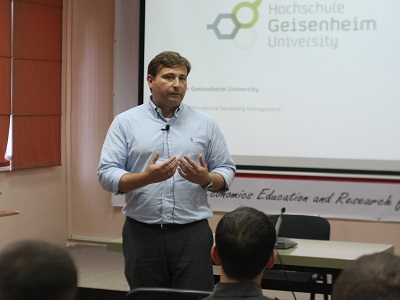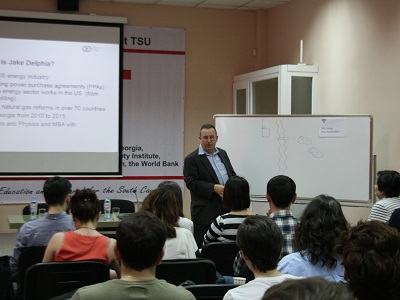“Money Can’t Buy EU Love – European Funds and the Brexit Referendum” is the title of a paper by Dr. Jan Fidrmuc of Brunel University, and immediately evokes images of several months ago when Remain voters lined the streets of London with ‘We Love EU’ placards and gold and blue flags, as well as recent savage arguments in Brussels over the best course of action as the continent struggles to get over the shock of a member state opting to leave the union.
Dr. Fidrmuc explained to his ISET audience that his paper found that many supporters of the Remain campaign came from British regions which benefited from European structural and cohesion funds, but that EU cohesion policies were undersold as part of the campaign itself. As well as beneficiaries, his paper also revealed that counties with lower unemployment
On Wednesday, September 7, ISET hosted Dr. Jon Hanf, Head of the Wine Economics Program at Geisenheim University, Germany, who spoke about the prospects of Georgian wine in the highly competitive German market.
Dr. Hanf started his presentation by stating the obvious – the world market is saturated with wine as global supply steadily exceeds demand by more than 30 million hectoliters. Cutthroat competition results in average prices remaining extremely low, way below Georgian production costs. The German market – the largest and perhaps one of the most competitive wine markets in the world – is a good case in point. For example, very reasonable wines offered by major German discounters, such as Aldi and Lidl (controlling more than 35% of total wine sales in Germany) retail about 1,90-2 Euro per bottle. Premium wines average 8-9 Euro. For comparison, Georgian wines attempt to enter the German market at 12-15 Euro per bottle, way above competition.
Congestion in electricity transmission systems is a common problem all around the world, Georgia included. Two types of congestion are observed in the power sector; physical and economic. Physical congestion occurs when a transmission system is not adequate to supply an increasing amount of electricity. Economic congestion appears when prices in one region are different from those in another region, while cheaper electricity cannot be sold to the region with high prices. Both types of congestion are problematic for Georgia.
Physical congestion is prevalent in Georgia because electricity is heavily used in the eastern part of the country, while most power plants are in the west (such as large HPPs). Economic congestion occurs because cheap electricity in western Georgia cannot always be delivered to eastern Georgia, where power plants produce more expensive electricity.













